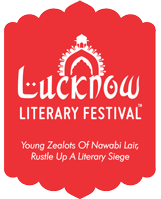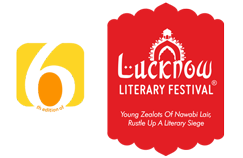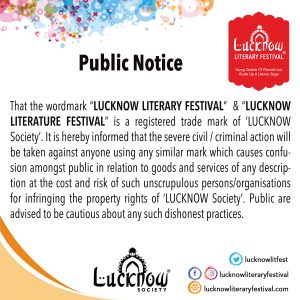Lucknow Literary Festival 2013 : Explore the NEWS
Day two of LLF features launch of some popular books dealing in sufism, mysticism, fiction, political biography, fantasy and poetry. Poetry and Lucknow and cinema remain the flavor of day with a documentary screening on the city’s Piscean symbol, a discussion on the celebrated nawab Wajid Ali Shah, the romance of poetry and cinema, history of dastangoi and the discussion on century of Indian films. Thoughts on media regulation and a session of gadgets catch young patrons. The day features performances by talented Lakhnawisalong side Atul Tiwari’s monologue for the city and Ankit Chadha’s dastangoi on Kabir. The Lucknow Literature festival is aptly concluded by a mushaiyra or culmination of Urdu shayars in a poetic evening.
Regulation on Media
Pankaj Srivastava, Saba Naqvi in conversation with Himanshu Bajpayee were on the discussion regarding the responsibilities and regulation on media. It is often argued that self-regulation is the best system for promoting high standards, not only in media but any industry. But how relevant is this argument in an era of profits chases and higher TRP ratings? A free media represents a free society, and a free society in turns is the breeding ground of free ideas! On either side, the argument presents its own gloomy and colorful pictures of India of tomorrow. Pankaj Srivastava, associate editor with IBN-7, countered the call for full freedom with a pointer towards media working like capitalist business houses of the day. Saba Naqvi was of the view that media houses should be more responsible. She said, “We should be able to something like that and not let government interfere with our work.” Moderated by Himanshu Bajpai, the discussion brought out the need for fine balance in this critical creative field. “A cynical, mercenary, demagogic press will produce in time a people as base as itself.” – Joseph Pulitzer
Book Launch ‘Mayan’ by A P Maheshwari
‘Mayan’ by A P Maheshwari is a fictional narrative about the difficulties and family bonds of his mother who is a cancer patient and what all hardships she had to go through. Mayan (mother in Rajasthani) talks about story of triumphs that his mother acheived through faith, love and determination despite all the odds pitted against her. Besides portraying psycological and emotional panaroma of a cancer patient and his family, the book also describes the pathology of disease and the treatment options available to a modern day cancer patient. Padma Shri Dr Nitya Anand & Padma Shri Runa Banerjee launched the book !
Decoding Young Minds
Amish Tripathi, Jugal Mody, Appu Pen in conversation with Nitin Prakash had a discussion on the reading habits of generation next which is used to everything on the move. The youth of today asks hard questions, demands honest answers and presents solutions for a better, more prosperous tomorrow. But at the same time- one sees more suicides, prevailing corruption and political disarray. Some enigma about the young minds prevail dynamic, confident and always connected – the youth speak a different language. A dialect understood by their peers and researched by the elderly marketers. Literary observers across generations ponder over this happy, optimistic but eccentric MTV generation which often behaves like a herd, but refuses to be branded sheep. Amish Tripathi explains that he do not write taking into consideration the minds of the audience, it is the conext which appeals him for writing. He adds that this generation do not accept things as told to them, they have various resources to explore the reality and new aspects. Appu Pen is a comic expert and do it for everybody and in his case the cartoon is explored by people regarless of language / region and age. He puts the content freely on internet, so that people are aware and interest is generated for the same. Jugal Mody is of the opinion that reading habits will stay but the entire process is going through a change process. Readers are now looking for new topics and the role of technology in making people aware about the globe is instrumental is making the shape of the young minds !
Gadgets : Technology Upgrade
Pankaj Umrania, Entrepreneur and expert on changing technology trends presented an insight into the upcoming gadgets and solutions from cool watches to high end televisions working for fast communication ! In a world where mobile OS versions change before you get used to the one, individual has too many options to upgrade and choose to when it comes to technology. Literature is not untouched by the technology and tech readers around you.
Workshop : ‘History of Dastangoi’ by Ankit Chadha
‘History of Dastangoi’ by Ankit Chadha was very interactive workshop and he laid stress on preservation and revival of lost art form. The word Dastangoi refers to the art of storytelling, it is a compound of two Persian words dastan and goi which means to tell a Dastan. Telling tales of adventure, magic and warfare, Dastans mapped new worlds and horizons, encountered the unseen and protected the hero through many travails and lovers as he moved on his quest. The first historian of Lucknow, Abdul Halim Sharar wrote in Guzishta Lucknow about the proliferation of the art of Dastangoi in the city after the mutiny. Every nobleman, he said, had made it a practice to employ a Dastango in his retinue as chowks or city squares became a favored site for performance of the art. In 1928, just a few years before sound revolutionized the Indian film industry, Mir Baqar Ali died, he was the last famous Dastango of India. The connection is not merely incidental, reports of his performances establish beyond doubt that he was perhaps the last great traditional actor to be born in this country. The first modern Dastangoi performance took place on 4th May 2005 at the India International Auditorium after the recent revival of the art !
The Sanjay Story
‘The Sanjay Story’ a book by Vinod Mehta showcases how a nation of over 600 million people bowed down to the whims and fancies of a Prime Minister’s pampered son. Vinod Mehta, now associated with the Outlook Group was the editor of a Bombay magazine during the Emergency, he was one of the target of the censor at emergency. The book is remarkably clinical in its approach and there is barely a trace of anger. Mehru Jaffer launched the book at the festival.
Vinod Mehta in conversation with Mehru Jaffer was an interactive session regarding Sanjay Gandhi. Vinod Mehta writes the biography of Sanjay Gandhi, India’s most controversial member of a Prime Minister’s family. As the title suggests story begins at Anand Bhavan, abode of Nehru’s in Allahabad and the kinship that Feroz Gandhi shares with the Nehru family. The book features all the facts of his emergence as a youth congress leader, his establishment of the Maruti factory and covers all the controversies of emergency period. By projecting light on the darker side of independent Indian history, book surely attracts a reader who has an interest in history, politics and current affairs. Vinod Mehta is attracted with the strong personality of Sanjay Gandhi and this is what our country needs today, he explains. Mehru Jaffer analysed the political situation since emergeny till today and the role of Nehru family in the post independence era in India.
Wajid Ali Shah
Amir Mohd Amir Sulaiman Khan, Asif Ali Mirza, Roshan Taqui, Amaresh Mishra in conversation with Veena Talwar Oldenburg explored the most loved ruler of Awadh, a visionary who pioneered a nation on secular, artistic and progressive foundations. The last nawab of Awadh, Wajid Ali Shah remains an elusive personality even today. There lied numerous personalities behind that twirled mustache and one finds a new facet of the man behind every skill he possessed. How did a dancer, poet, playwrite and a patron of numerous art forms balanced the act of a compassionate administrator? Raja Mehmoodabad explained that Britishers were on their plan and way to annex Awadh and so the allegations were framed to defame the ruler. Wajid Ali Shah was the true reresentative of the Ganga-Jamuni Tehzeeb and this was alarming for the Britishers as their philosophy was Divide And Rule, Amaresh Mishra added the point in discussion. Asif Ali Mirza informed us that Wajid Ali Shah is the author of 117 books and his personality was full of various aspects related to art & literature. His popularity and his contributions in various fields were explained by Roshan Taqui. Veena Talwar Oldenburg highlighted the fact that the Ramayana was being translated into Urdu under the patronage of the King and he was very interested in the subject of Lord Krishna – Radha. Naseer Uddin Shah, as an audience ask the question about the relevance of the film Shatranj Ke Khiladi by Satyajit Ray and Asif Ali Mirza answered that one has to see the movie in great detail to capture the greatness of the Jaan-e Aalam ! Anees Ashfaq, again as an audience added a point that Wajid Ali Shah is credited with the 1st drama of Urdu langauge ! Raja Mehmoodabad demanded a subject of Awadh History in Lucknow University and some institutions in name of the Great King Wajid Ali Shah !
Documentary : Nishaan-e Lucknow
The documentary tries to track the origin of the fish in the history and culture of Awadh and its capital Lucknow. The 15 minute documentary film dives deep into anectodes, old monuments, royal descendants, historians, citizens and retrieves precious pearls of information. The mystery behind the presence of fish motif on diverse architechture, culture and even on state government’s insignia is thus revealed !
Book Reading : Reading by Jugal Mody from his book ‘Toke’
‘Toke’ by Jugal Mody is a fun packed book that talks about a boy who is definitely not a hero. Lord Vishnu showed up on him and asked him along with his two friends to save the world. He was joined by his two friends along with his crush, two Japanese girls, an office colleague, a crow and an eagle on this mission to save the world. This book hilariously talks about the adventure Nikhil and his friends went through while rescuing the world. When someone in the audience asked Jugal about the resemblance of the title ‘Toke’ with regular Lakhnawi slang for cigarette shops, he pointed out in a light vein, the role of ‘pot’ in the development of the ‘plot’ of the book !
A Century in Indian Cinema
Muzaffar Ali, Atul Tiwari, Asif Jah, Amit Rai in conversation with Yatendra Mishra bring in nostalgia, recollect memories and salute the personalities that made it happen over the century. Indian cinema will complete 100 years in May 2013; as it was a century ago, in 1913, that the first Indian film Raja Harishchandra, came out. The landmark films of Indian cinema that have enthralled generations of viewers over the past century. Not only entertainment, this industry has yielded a new life to literature, art, culture and folk along with being an exercise in cultural diplomacy to woo the world through India’s soft power. Muzaffar Ali highlighted that a film involves lot of people with various aspects and a successful century in the same is a brilliant landmark. The commercialisation which has big impact on the film industry can lead to decline of real art, pointed out by Yatendra Mishra. Film Najma by Mehboob Khan in 1943 highlighted Lucknow for the 1st time and the journey continues till today with Dabang 2, this fact was contributed by Atul Tiwari. He also talked about the impact of Awadh in films, like Ganga-Jamuna & Lagaan who are based at Awadh but the name is something else in the film. Asif Jah discussed that the culture of Awadh is prominently adopted in cinema as this is the national culture of the country. Amit Rai presented a different aspect about the Indian film industry that it is not as per the international standards and lacking in international arena. He gave a beautiful example that if a girl has to learn acting, she should see the acting of Rekha in the movie Umrao Jaan, which is of high standard in acting !
Dastangoi : ‘Dastan Dhai Aakhar Ki’
A unique art of story telling, performance describing the fifteenth century mystic saint & poet Kabir. A story on Kabir is composed and performed by Ankit Chadha, under the direction of Mahmood Farooqui. The dastaan takes on a journey about finding the Kabir who is around you and, in you!
Book Launch : ‘The Oath of Vayuputras’ by Amish Tripathi
‘The Oath of Vayuputras’ is the third and the concluding part of the best-selling Shiva trilogy by Amish Tripathi. ‘The Immortals of Meluha’ d ‘The Secret of the Nagas’, the first two novels have been commercial successes with million copies sold in the span of two years and with a gross retail sale of Rs 22 crores. The Shiva Trilogy has been referred to as ‘one of the most successful book series in the history of Indian publishing’. ‘The Oath of Vayuputras’ finally reveals the root of the all evils. Shiva, the savior of Meluha, reaches Panchvati where he comes to know about his true enemy. The Neelkanth declares a holy war to destroy the evil. Series of battle begins that agitates the whole of India. In order to win the battle, Shiva reaches out to the Vayuputras who have never helped him earlier. The book narrates the vigorous journey that Shiva took to triumph over the Evil. The highly awaited and anticipated Shiva Trilogy of author Amish Tripathi comes to a spell-binding conclusion. Veena Talwar Oldenburg did the honour of launching the book !
A Paper on ‘Faiz Ahmad Faiz Ka Lucknow
Atul Tiwari presented a paper on the legendary poet Faiz Ahmad Faiz and the city of Lucknow. Faiz, whose revolutionary writings resonated in the per-independence India from Lahore to Lucknow, visited the city of Nawabs as a young writer to attend the first conference of Progressive Writers Association in Lucknow in 1936. Faiz was immensely impressed by the inaugural address, delivered by Munshi Premchand, and which later the watershed moment that changed the scenario of literature, arts, theater, films and even politics in India. Faiz, who had just turned 25, was young, full of verve,impressive and impressionable. And the stamp or imprint that Lucknow left on him, the bond that this city made with him was the bedrock of a life long relationship. Atul Tiwari had earlier presented this paper during the centenary birth celebration of Faiz Ahmad Faiz in Lahore in 2011. He hailed the such festivals as occasions where younger generation gets opportunity to know about the past legacy. He hails Faiz, like Manto, as a writer beyond boundaries, and said, “He belonged as much to Asia as to Africa, as much to Beirut as to Bangladesh, as much to Pakistan as to India, and belonged as much to Lahore as he belonged to Lucknow.”
Mushaira
“Khud Ko Manwane Ka Mujh Ko Bhi Hunar Aata Hai,
Mein Woh Qatra Hoo Samandar Mere Ghar Aata Hai”
– Waseem Bareilvi
Lucknow being one of the most prominent schools of Urdu Poetry. A Lucknawi social gathering is incomplete without few couplets being exchanged, what’s better than a Mushaira to conclude the Literary festival. A culmination of top contemporary Poets – Padma Shri Gulzar Dehlvi, Malikzada Manzoor Ahmed, Waseem Bareilvi, Munawwar Rana, Anwar Jalalpuri, Sehba Ali, Aadil Rasheed, Manish Shukla, Malikzada Javed, Shabeena Adeeb, Faheem Jogapuri, Tilak Raj Paras, Tariq Nizami, Sankalp Sharma, Faheem Rajput recited their poetry !
BOOK LAUNCH : ‘Aakhri Parwaaz’ is the Kulliyat ( Complete collection of Poetry ) of Mehboob Hasan Khan Nayyar Tilhari, a prominent Urdu poet of Tilhar, Shahjahapur. Compilation is done by Aadil Rasheed Tilhari, as a tribute to his Ustaad & book launch was done by the poets of LLF Mushaira.
“Woh Kehte Hain Yeh Mera Teer Hai Jaan Leke Niklega,
Mein Kehta Hoo Yeh Meri Jaan Hai Mushkil Se Niklegi”
– Gulzar Dehlvi


















